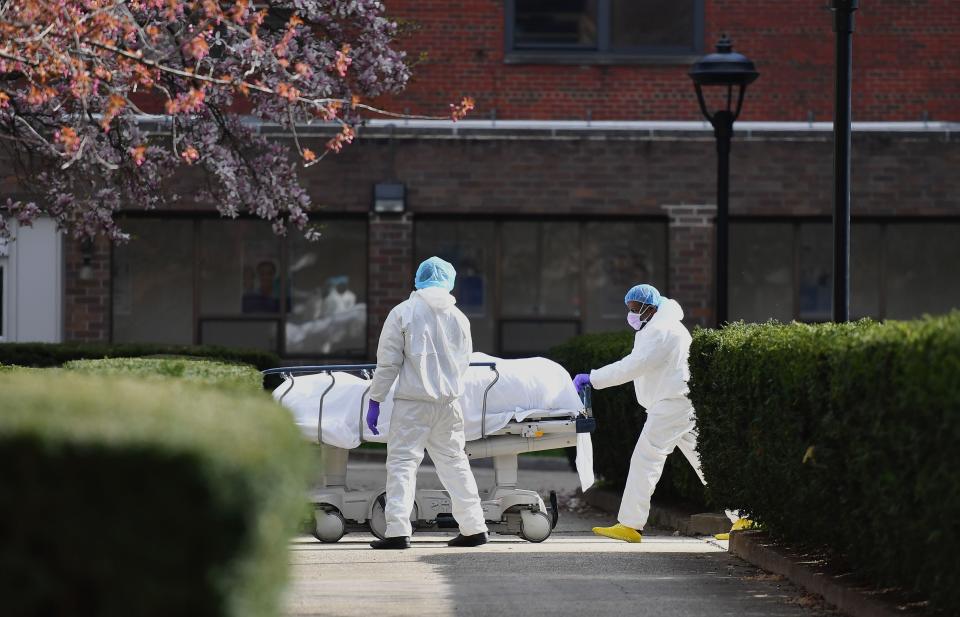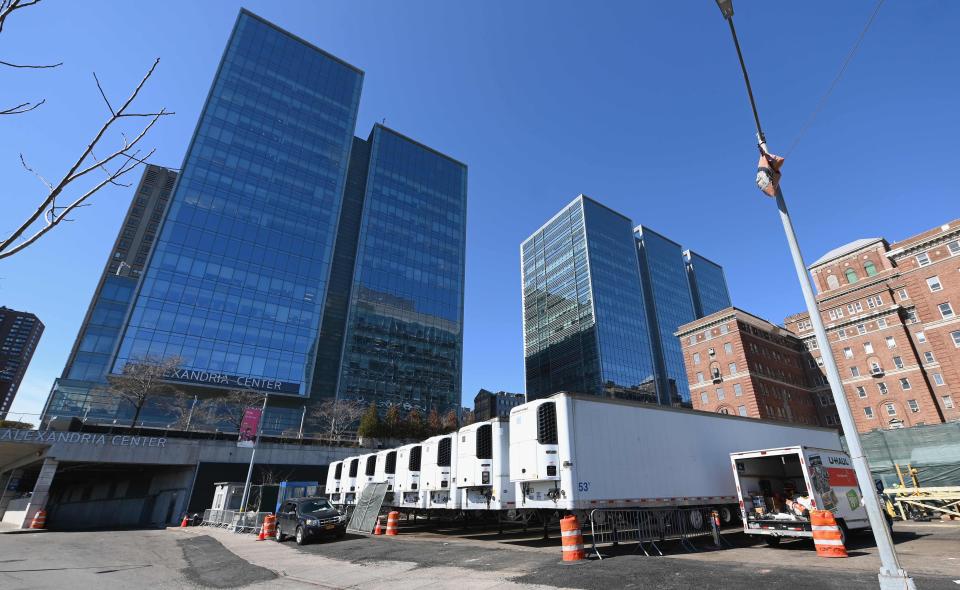Coronavirus hotspots brace for deaths with refrigerated trucks on an unprecedented scale
Music festivals have been canceled, gatherings prohibited, construction projects stalled. Yet Keith Futerman has been inundated with calls from prospective clients requesting estimates for mobile cooler and freezer rentals.
A Maryland hospital needed extended morgue space. A family-owned cemetery in California wanted walk-in units. A hotel inquired about cooler storage.
“Who knows what they’re doing,” said Futerman, director of sales at Stewart’s Mobile Concepts in Huntington Station, New York. “I get so many calls I’ve just got to pump out the quotes.”
The coronavirus pandemic sweeping America has brought a surge in business to the refrigerated truck and storage industries. As the specter of virus-induced deaths looms, medical examiners and funeral homes across the U.S. are scrambling to secure temperature-controlled trailers in anticipation of overwhelmed facilities.
Even grocery stores have taxed the refrigerated truck industry in an attempt to keep their freezers well-stocked for Americans now eating most of their meals at home.
The use of refrigerated trailers, known as reefers, is a common contingency plan in the event of natural disasters or mass fatality events like Hurricane Katrina or 9/11. But rarely, if ever, have they been deployed on such a massive scale to so many places at once — and in such a public way.
Images of people in protective suits loading bodies into trucks have appeared in numerous media outlets in the past few weeks. And they have prompted questions about respect for the dead and — when the makeshift morgues are no longer needed — what happens to the trailers.

“Though our forensic pathologists and everybody at the medical examiner’s office deals with death everyday, it’s obviously difficult for us to see this many deaths from a single event,” said Natalia Derevyanny, a spokeswoman for Cook County, Illinois.
Planning for the worst
For now, refrigerated trailers remain empty in potential emerging coronavirus hotspots such as those in Illinois, Louisiana and Florida.
Cook County, which includes Chicago, has secured two refrigerated trucks and a 66,000-square-foot warehouse. It had counted 351 coronavirus-induced deaths as of Thursday, and its morgue was more than 85% full.
“Our hope is that we don’t have to utilize" the additional space, Derevyanny said. "But we want to be prepared for any eventuality."
Typically, the bodies of those who die in hospitals go straight to funeral homes, where they are prepared for memorial services. But as COVID-19 deaths mount and hospital morgues fill up, medical examiners are seeking additional capacity.
It’s not uncommon for bodies to spend a week at a morgue even under normal circumstances as families make preparations to bury their loved ones, said Shane Evans, chief of investigations at the East Baton Rouge Parish Coroner’s Office. The coronavirus can extend that time even further.
“If a loved one dies of COVID-19 illness, it’s likely the surviving family members will be placed under quarantine," he said. "We’ve had some instances where a family member was in another state and because of that was only able to use the phone to try to make arrangements.”
In Louisiana, where the death toll rose to 702 by Thursday, the Governor’s Office of Homeland Security and Emergency Management sent 20 refrigerated tractor-trailers to the New Orleans area and one trailer each to Allen, West Feliciana, St. Tammany and East Baton Rouge parishes as of Wednesday, said agency spokesman Mike Steele.
The tractor-trailers come from Lipsey Logistics Worldwide LLC, with which the state has had an emergency-contingency contract since 2018. The cost is $7,000 per 53-foot-long trailer per week, which includes maintenance and fuel to keep the refrigerated unit operating 24/7 and required decontamination, said Jacques Berry, a spokesperson for the state’s division of administration.
Palm Beach County, the hardest hit in Florida, leased two 40-foot refrigerated trailers when its morgue approached 50% of its 100-body capacity, said Paul Petrino, operations manager at the county medical examiner’s office.

Medical examiners interviewed by the USA TODAY Network said the deceased are treated respectfully even if their bodies are stored in a refrigerated trailer or warehouse for a short time. In those cases, the bodies are placed face up inside a waterproof bag made of thick plastic with nylon straps and reinforced webbing.
Each individual’s hospital bracelet or government-issued ID is generally affixed to the body bag, if possible. Otherwise, bags are marked with the individual’s identifying information using a paint pen.
If the death toll mounts high enough, coroners said, shelves can be added in many temperature-controlled units to accommodate additional bodies.
“Our forensic pathologists are the last physician these patients will ever have, and they really do take that responsibility very seriously and want to make sure they are all treated in a dignified and respectful manner,” Derevyanny said.
Changing business
The refrigerated unit rental business typically caters to institutions like schools, hospitals and nursing homes that need additional refrigerator space during renovation projects, or large-scale festivals and trade shows with on-site food service.
While the industry has shifted to meet changing needs during the pandemic, Travis Simmons, director of special events at Georgia-based Lowe Rental, said actual product movement hasn’t yet matched the rise in inquiries about cold storage pricing and availability.
“We keep hearing that it’s coming, but it’s not necessarily taking off,” Simmons said.
The demand isn’t all for coronavirus patients, though.
“The requests we’re seeing are more from funeral homes trying to keep up with the capacity of people just passing away naturally. They can’t have burials, can't have people gathering — they simply can't put them in the ground,” Simmons said.
After the Sept. 11, 2001 terror attacks, Simmons said he sold a New York City coroner’s office several 40-foot coolers to be used in the event of another mass casualty. “If they need (the extra morgue space), it’s there,” he said.
Contamination concerns
Refrigerated units also keep seeds and floral arrangements fresh. They protect pharmaceuticals and sensitive electronics. And, most commonly, they store and transport food.
Lowell Randel, vice president of government and legal affairs for the Global Cold Chain Alliance, said 90% of the items the alliance’s 1,300 member companies handle are food products — from the point of slaughter or harvest to refrigerated warehouses to transport by land and sea.
Demand for those products is “absolutely at a very high rate right now,” he said.
“Because of social distancing and commercial restrictions, particularly on restaurants," he said, "we’re seeing less movement of food service-related products but definitely an increase in products going to retail and grocery stores.”
Mike Smith, co-owner of Smith Trucking, a southwest Minnesota-based shipper, said he has 125 tractors and 240 refrigerated trailers running at full capacity — protein to California, bulk Chinese food to Chicago, raw materials like chicken bones back to Minnesota from the east coast.
“We turn down more loads than we haul,” he said.
In Ohio, Arctic Express CEO Richard Durst said refrigerated carriers were in “incredible demand trying to get grocery (distribution centers) restocked” as shoppers emptied store shelves in recent weeks. “I think the food supply chain reacted amazingly well when all the (coronavirus) news was being dumped on us.”
Most of Arctic Express’s 82 tractors and 138 refrigerated trailers are running, as long as drivers are available, he said.
“We’ve had five major shippers give us some indication that things might be slowing down,” Durst said. “I think that initial panic may have subsided — either that or everybody has a freezer full and there's no place else to put any more hamburger.”
So far, refrigerated truck operators say they haven’t been called on much to use the trailers that transport consumer goods as additional morgue space.
But Durst said he has considered how he might respond if the government comes calling. He said he’d rather not risk his company’s brand by renting to morgues.
“A new reefer unit and trailer is $70,000. As much as you want to be helpful, there’s a limit,” Durst said. “I think I would have to say no unless they came with a check and wanted to be the new, proud owner of that reefer trailer.”
Randel said alliance member companies who were approached during past disasters typically sold or donated refrigerated trailers rather than renting them.
“Having said that, you can very effectively sanitize and clean the trailer,” Randel said. “There are companies and procedures to deal with hazardous waste and biohazards and sanitation in those instances.”
Strict protocols are already in place for food transportation, Smith noted, although the realities of shipping meat, for instance, involve details most people would prefer not to ponder.
“With fresh-cut products, there can be leakage,” Smith said. “That’s not uncommon.”
After trailers are unloaded, they’re soaked with a sanitizer soap solution, pressure washed with 185-degree water and inspected before reloading, he said.
“That’s our livelihood," he said, "and we take that very seriously.”
This article originally appeared on USA TODAY: Coronavirus deaths: States prepare for bodies with refrigerated trucks

